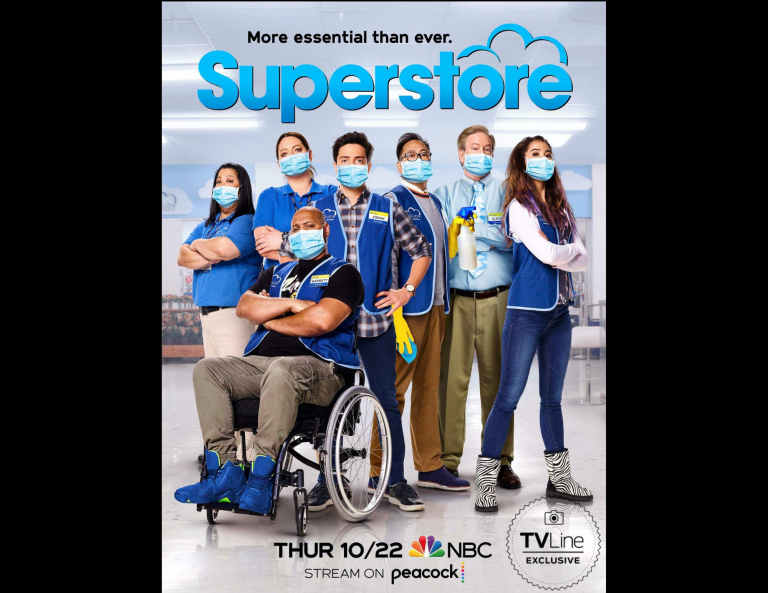Content warning: Immigration and Customs Enforcement (ICE) detainment
Are you looking for a new show to commit to during quarantine? In search of good comedy? Look no further than NBC’s “Superstore.” The 2015 sitcom was created by Justin Spitzer and is co-produced by Stanford alumni Jonathan Green ’95 and Gabe Miller ’93.
Season six of “Superstore” is set to air on Oct. 29, after season five ended with main characters Amy Sosa and Jonah Simms headed for Palo Alto.
Aside from being genuinely good comedy (“Superstore” is way better than “The Office,” in my opinion), the show touches on important and relevant topics such as labor issues, culture and identity and immigration among many others — something I really appreciate.
The show is centered around a retail warehouse store in St. Louis, Missouri. This branch belongs to the large Cloud 9 franchise, which eventually becomes owned by parent company Zephra. While the show mainly focuses on the experiences of main character Amy Sosa, it does a good job of equally showcasing the lives of supporting characters.
At the beginning of the series, we are introduced to Amy, portrayed by America Ferrera who is also a co-producer for the series. Amy is a floor supervisor at Cloud 9 Store #1217 and eventually works her way up to store manager. She is headed to Cloud 9 Headquarters to become Director of Customer Experience, through which she would oversee all locations. When contemplating the offer, Amy feels guilty about becoming a “sellout” by accepting the position. This stems from the idea of tokenism in the workplace, which is brought up in the season five finale. She is reluctant to accept the role as she realizes she was offered the position because she is Latina and not because of her merit and qualifications. After thinking about this dilemma more, Amy accepts the position and plans on moving to Palo Alto. While the basis of this offer is controversial, by having Amy become Director of Customer Experience, the show is depicting the tearing down of glass ceilings, something that needs to be worked on in the real world.
Furthermore, the cast and characters have diverse backgrounds and experiences. This not only allows audiences to see themselves in film and television, something that hasn’t always been historically true, but validates audiences and their stories. UCLA’s Hollywood Diversity Report 2019 illustrates that while there is an increase in representation in the entertainment industry, women and minorities remain underrepresented.
According to the report, 77% of top film roles were played by white actors/actresses. Further, among most racial and ethnic groups, women were significantly underrepresented as featured actors in the top 2017 films. The industry still has a long way to go. The report also illustrates that audiences prefer works with a diverse cast.
Among the amazing and diverse cast of “Superstore” are Ferrera (lead of ABC’s 2006 “Ugly Betty,” which is an adaption of the Colombian telenovela “Yo soy Betty, la fea”), Ben Feldman (“The Perfect Man”), Nico Santos (“Crazy Rich Asians”), Kaliko Kauahi (NBC’s “Parks and Recreation”), and many others.
My first encounter with the show was with the season four finale, “Employee Appreciation Day,” in which store associate Mateo Liwanag is detained by Immigration and Customs Enforcement (ICE) after Cloud 9 corporate sends ICE to the St. Louis branch after learning about Mateo’s undocumented status. Though the audience is made aware of Mateo’s undocumented status earlier in the series, some of the characters first learn about it during this episode.
“Employee Appreciation Day” first aired in May 2019, which was around the time the Trump administration began to threaten undocumented families through ICE raids targeting certain cities. I was stunned that a show had raised awareness around the undocumented status in the United States and covered the topic of ICE and ICE raids.
At the end of the episode, I knew I had to watch more of this show. I admire its ability to cover sensitive topics and recent controversies. Not only does the show actually make me laugh, but it’s relatable on so many levels, it does not resort to cheap, dirty humor and it’s real. Real in the sense that I can see many different people, personalities and perspectives represented in it.
Contact Rosana Maris Arias at rosmar18 ‘at’ stanford.edu.
